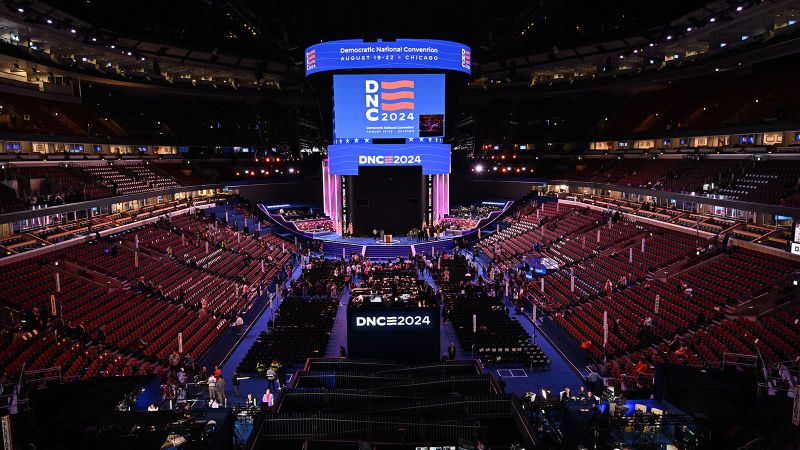Leaders of the Uncommitted National Movement began a sit-in outside the Democratic convention Wednesday night after being told by party officials that they will not get a speaking slot at the gathering.
Co-founder Abbas Alawieh, whose group emerged during the Democratic presidential primary to marshal protest votes against the Biden administration’s support for Israel’s war on Hamas in Gaza after the October 7 attacks, told reporters he received a call from a convention official Wednesday night, saying, “Abbas, the answer is no.”
Alawieh, an uncommitted delegate from Michigan, then sat down on the concrete outside the United Center, with images of Kamala Harris shining out over him, and said he would not leave the spot until the vice president and convention organizers reversed their decision. He was quickly joined by other uncommitted delegates and, toward the end of the program, Minnesota Rep. Ilhan Omar briefly joined the group. Rep. Alexandria Ocasio-Cortez also expressed support for the group on social media and urged the DNC to reverse its decision.
Besides a speaking slot, movement leaders also had other asks, including for a US government arms embargo against Israel, that were rejected out of hand by Democratic leaders.
Before addressing reporters, Alawieh called for a moment of silence. He then described being a child, at 15, in Southern Lebanon during an Israeli bombing.
“Our government’s policy is to kill people like me,” he said, growing increasingly emotional.
Alawieh recalled that he decided not to protest in the streets but to work with the Democratic Party hierarchy and to lobby convention organizers and the Harris campaign, reasoning that his group could persuade Democrats to allow it a voice in Chicago.
“I’m an insider. I work the system,” said Alawieh, who previously worked for former Michigan Rep. Andy Levin and was a staffer on Capitol Hill during the January 6, 2021, insurrection. (Alawieh repeatedly said that his group had no desire to lift up Donald Trump or help the former president’s campaign in any way.)
He calledthe decision to deny the uncommitted movement a speaking slot infuriating and heartbreaking, especially after so many phone calls and talks with organizers and the Harris camp.
The Democratic National Committee on Monday sanctioned a panel, inside the formal convention perimeter, about Palestinian and Arab issues. The group called it a small win but continued to push for a more prominent stage.
The combination of new enthusiasm for Harris’ campaign, which Democrats have been celebrating all week, and frustration among activist groups over President Joe Biden’s refusal to stop arms shipments to Israel has created an occasionally disorienting split-screen in Chicago, where protesters have marched outside the convention every day. Though little has changed on the ground in Gaza in recent months, some leading progressive groups, anti-war organizers and Palestinian American and other Arab American activists initially expressed openness to Harris, who has spoken with greater empathy about the bloodshed. More than 40,000 Palestinians have been killed in Gaza, according to the health ministry in the enclave.
Earlier Wednesday, less than an hour before the parents of Israeli American hostage Hersh Goldberg-Polin addressed the convention, Alawieh praised the DNC’s decision to give the family a platform.
“We strongly support” the family being given a speaking slot, he said before the speech. “We are glad to see that the DNC is taking this step. And, as Democrats, we know that our own party’s platform includes specific language that says that our party recognizes that Israeli lives and Palestinian lives, that they are valued the same.”
Speaking to reporters later, Alawieh said that while he was seated as a delegate inside the United Center and hearing about the 109 hostages still in Gaza, he also thought about the thousands of Gazan children who have been killed.
“I could have been one of those children,” he said repeatedly. “President Biden, Vice President Harris, what are we talking about? We’re talking about children.”
CNN’s Veronica Stracqualursi contributed to this report.
Read the full article here




